The SQLBits agenda is available for you to view in all its glory, right here!
Rob Sewell has gladly provided us with some interesting numbers about the sessions and the speakers and provided some insight and information into the behind-the-scenes effort that is required to provide a top-quality, five-day data conference!
So Close to the Perfect Number of Submissions!
Let’s start with some information about the number of submissions that we received. There were an incredible 1033 sessions submitted into our system this year! Thank you once again to everyone who took the time to submit!
Please note that a few of these can quickly be ignored as they are test sessions created whilst testing a bug with Sessionize Support (Oops!)
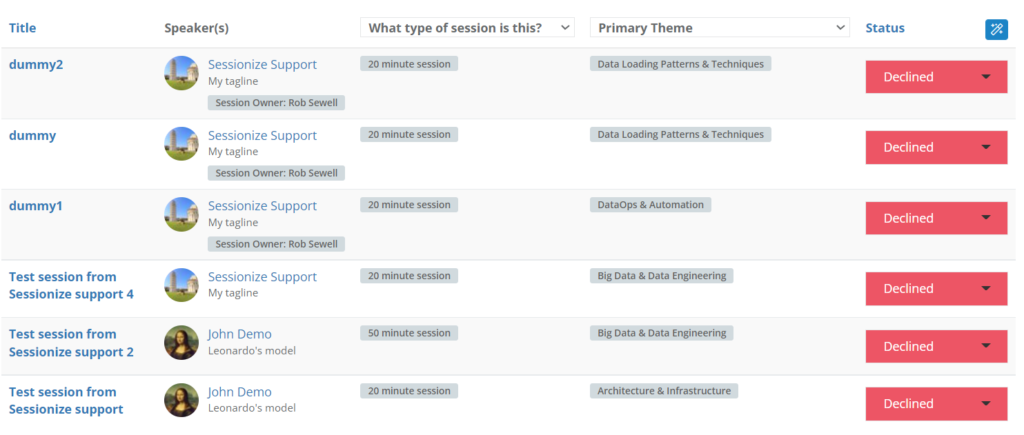
Those six above, plus a test one from Rob, and three sessions that were withdrawn before the call for speakers had closed brought us down to 1023 sessions, which is still impressive. (Although how Rob wished that it was 1024 as he said at the time!)
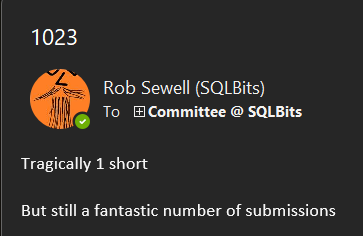
GROUP BY sessionlength and GROUP BY PrimaryTheme
The 1023 session submissions were split up into three types of sessions by length of session. SQLBits is comprised of fifty-minute sessions, twenty-minute sessions and five-minute lightning talks for the general session days Thursday, Friday, and Saturday.
| Session Type | No. of Sessions |
| 20-minute session | 203 |
| 5-minute lightning talk | 32 |
| 50-minute session | 788 |
There were twelve primary themes. This was a lesson that was learnt from last year. To make it easier for evaluations and for attendees to find the sessions that they would like to attend, we only allowed a single primary theme per session
| Session Type | No. of Sessions | |
| Architecture & Infrastructure | 102 | |
| Big Data & Data Engineering | 103 | |
| Data Loading Patterns &Techniques | 68 | |
| Data Science & Machine Learning | 38 | |
| Data Security & Governance | 76 | |
| Data Visualisation & Modelling | 182 | |
| Database Administration | 102 | |
| DataOps & Automation | 58 | |
| Developer | 96 | |
| No Code & Low Code | 28 | |
| Non-Technical | 143 | |
| NoSQL/NewSQL | 27 | |
We were particularly delighted that the Non-Technical theme had so many submissions. Many thanks to everyone who promoted that and specifically a call out to Matthew Roche who has been so committed to the Non-Technical theme and promoting it. Thank you Matthew.
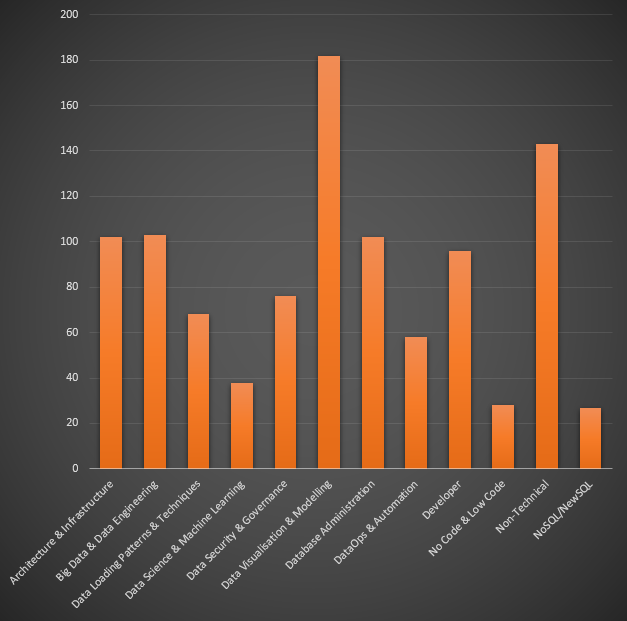
The Greatest Incentive
Call for Speakers was open for four weeks. It came as no surprise, to anyone who has run a call for speakers, that the biggest incentive for submitting is the pressure of the deadline! A whopping 43% of submissions came in the last 36 hours!
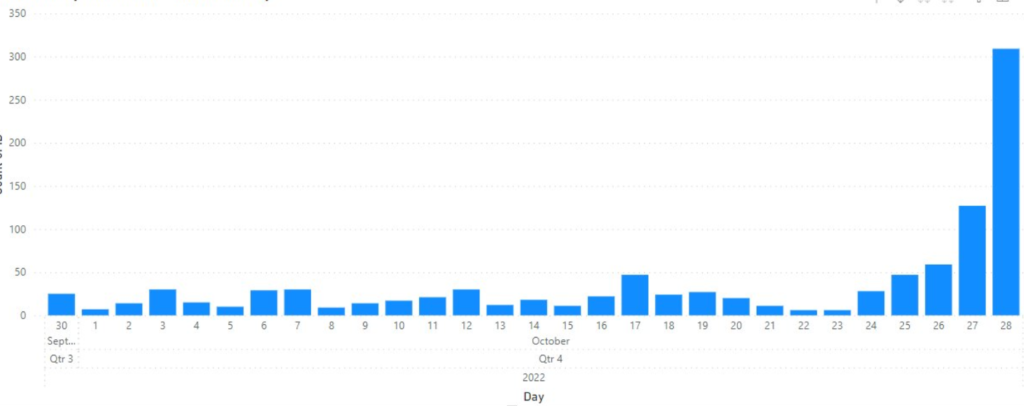
All Over the World
We had 441 unique speakers who submitted for SQLBits for 2023. Of those,331 provided a country.
We had speakers submitting from 41 countries!! (N.B. Unnamed Company – Berkshire is not a country ?)
The top six countries that people submitting came from are shown below
| Country | No. Of Speakers |
| UK | 94 |
| USA | 75 |
| The Netherlands | 28 |
| Denmark | 15 |
| Germany | 13 |
| Norway | 8 |
Diversity, Equity, and Inclusion
When Rob came to analyse the data, he realised that there was a complication. This was the question that was asked:

Looking at the responses, we could see that there were some people who had answered no and had also shared pronouns that SQLBits would like to record as part of an under-represented group (She/Her for example). So, we have repeated the data wrangling that we did last year to include those speakers too. This means that the data for Diversity, Equity, and Inclusion is slightly different from how speakers wish to identify but will also enable us to understand trends with comparable data.
With that in mind, out of the 441 distinct speakers, we received submissions from 122 or 28% of people from underrepresented groups in tech. This is an increase from 23% for submissions for SQLBits 2022.
Choices, choices, choices
1023 submissions and 441 speakers. If only we could have accepted them all, but this was not possible.
There are only so many rooms at the ICC Wales and so many virtual tracks where we can have sessions (and only so many hours in the day!!). We have 120 spaces for 50-minute sessions and eighty spaces for 20-minute sessions and we had to work out how we could split those into themes.
About halfway through the call for papers, we used the percentage of submissions per theme as a starting point for deciding the split of sessions per theme. Then we used an Excel worksheet (see below) that was wrangled to get what we wanted for SQLBits 2023. The picture below was our final target. There are many reasons why this will not be the end result (speaker dropouts to give one example).

The majority of the task of evaluating sessions, and then selecting them, was performed by our fantastic seventeen theme content owners and fifty-four session selectors (You know who you are. Thank you so much). The content owners had been mollycoddling the sessions during the call for papers and for a few days afterwards. They ensured that the sessions were in the correct themes, had good titles and abstracts, and were relevant to SQLBits. With all of that in a good place, we used the Sessionize evaluations to rank the sessions for each individual theme and session type. This involves comparing three sessions at a time and ranking them. Sessionize then provides a rank of all of the sessions in a theme. We had two evaluations per theme (for most themes), one for fifty-minute sessions and one for twenty-minute sessions.
Once that was finished. The content owners picked the sessions for their theme using
- the evaluation ranking
- their requirements for the breadth of the topic
- their requirements for the depth of content
- the diversity of the speakers.
Finally, Rob had to make sure that we did not overload speakers who provided super abstracts in numerous themes. There were two speakers, in particular that Rob was thinking about. One had sessions that were ranked first, first, second across three themes and one had sessions ranked first, second, and third in their theme. In both of those cases and for some other speakers we had the immensely difficult job of choosing which of these sessions should not be chosen. We were, as always, very grateful for the help of Ben Weissman and Jess Pomfret in doing this.
Final wrap-up – The selected 200!
We have moved from 1023 down to two hundred and asked the speakers to confirm their attendance. We know that there will be changes in the next 3 months between now and SQLBits 2023 in Wales in March but here are some details about the chosen sessions.
We have 120 50-minute sessions and 80 20-minute sessions split across the themes (we currently have one space open due to a speaker who has cancelled.)
| Session Type | No. of Sessions |
| Architecture & Infrastructure | 22 |
| Big Data & Data Engineering | 20 |
| Data Loading Patterns & Techniques | 12 |
| Data Science & Machine Learning | 6 |
| Data Security & Governance | 17 |
| Data Visualisation & Modelling | 33 |
| Database Administration | 20 |
| DataOps & Automation | 12 |
| Developer | 13 |
| No Code & Low Code | 4 |
| Non-Technical | 37 |
| NoSQL/NewSQL | 3 |
| Grand Total | 199 |
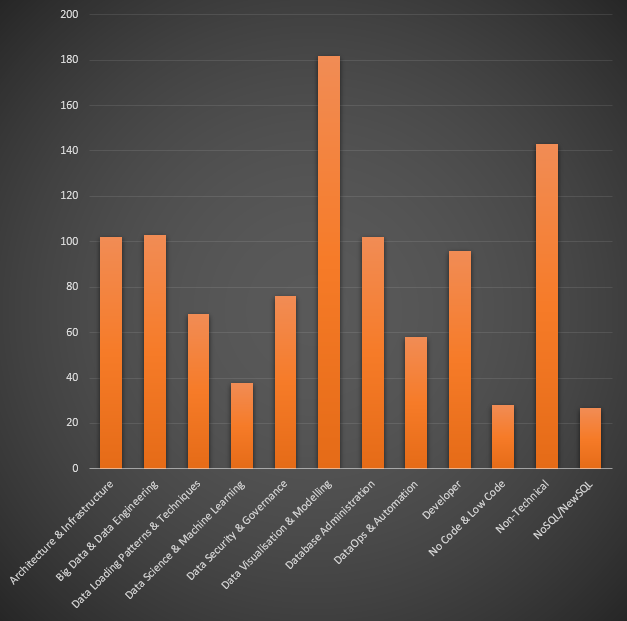
We have 184 speakers and by our definition, 38% come from underrepresented groups in tech which is an improvement from last year’s 31%. Remember that this is our definition from earlier and we have used the data to the best of our ability. We are satisfied that we are moving in the right direction but know that there are always improvements that can be made. If you have any suggestions, please email dei@sqlbits.com
The Agenda has Gaps?
When you go and peruse the agenda you will notice that there are gaps. Whilst we have finished this process, we are still finalising other sessions, particularly from Microsoft and other sponsors. Note also that the agenda will change. There are still three months until the event and we know from experience that there will be changes in people’s circumstances that will require us to alter the agenda.
If you have any questions or queries about our session selection, we’d love to hear your feedback to take it into account for next year’s session selection. In the meantime, a huge thank you to Rob for explaining the entire process and shedding some light on the process. Let us know what you think of the agenda!
